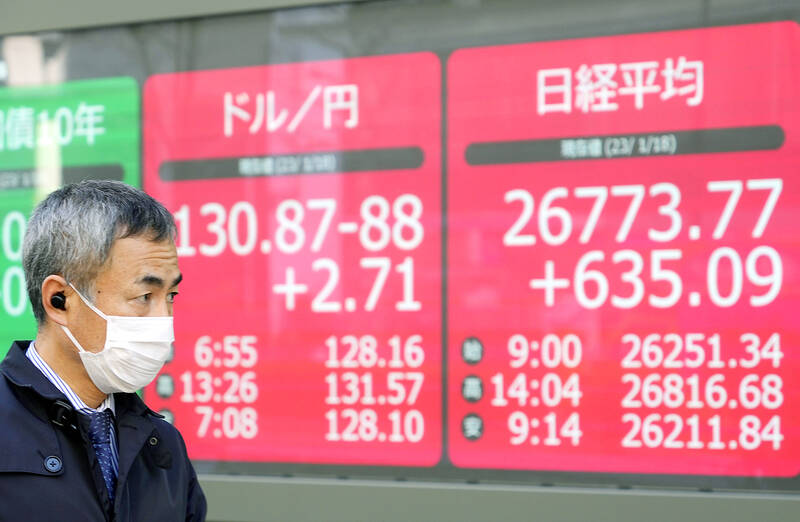Stocks rose globally yesterday while the yen tumbled, after the Bank of Japan (BOJ) poured cold water on monetary tightening expectations, and economic and earnings data proved cheery for European markets.
In addition, data showed that inflation in the UK dropped to a three-month low of 10.5 percent last month, the latest sign that global inflationary pressures are abating.
Europe’s STOXX 600 index rose to its highest level since April last year, and London’s FTSE 100 scaled a fresh four-and-a-half-year high after the latest British inflation numbers, while US stock futures were mixed.

Photo: EPA-EFE
MSCI’s broadest index of shares in the Asia-Pacific region outside of Japan rose 0.4 percent.
The market spotlight was also on Japan, where the yen slid and government bond yields fell the most in two decades at one point, retreating sharply from the BOJ’s 0.5 percent ceiling after policymakers decided to keep yield curve controls in place.
The central bank last month stunned the market by raising its cap on the 10-year yield to 0.5 percent from 0.25 percent, doubling the band it would permit above or below its target of zero percent. Since then, speculation had swirled that the central bank could tweak its yield curve control policy further or even scrap it.
However, instead of changing its stimulus program, the BOJ crafted a new weapon to prevent long-term rates from rising too much — a move some analysts took as a sign BOJ Governor Haruhiko Kuroda would hold off making big policy shifts during the remaining months of his term, which ends in April.
“This step will allow us to push down longer-term interest rates, without directly affecting supply and demand of the cash Japanese government bond market,” Kuroda told a news conference. “We’d like to use this tool for various maturities, and in various ways.”
The 10-year yield plunged as much as 14 basis points to 0.36 percent at its lowest point, which would have been the biggest one-day decline since September 2003, before edging back up to 0.43 percent as of 6:24pm. The Nikkei 225 index jumped 2.5 percent to 26,791.12, its highest close since Dec. 19 last year.
“It was a tough day for the bond vigilantes who were positioned to bully the BOJ into a policy change not justified by their economic forecasts,” Westpac Banking Corp senior currency strategist Sean Callow said.
US DOLLAR RISES
The US dollar was up 1 percent at ¥129.53, but well off session highs.
The dollar index, which measures the safe-haven US dollar against six peers, rose 0.4 percent. The pound rose more than 0.4 percent, and the euro gained 0.6 percent.
Meanwhile, oil prices rose yesterday, extending the previous session’s gains, driven by optimism that China lifting its strict COVID-19 curbs would lead to a recovery in fuel demand in the world’s top oil importer.

Taiwan’s technology protection rules prohibits Taiwan Semiconductor Manufacturing Co (TSMC, 台積電) from producing 2-nanometer chips abroad, so the company must keep its most cutting-edge technology at home, Minister of Economic Affairs J.W. Kuo (郭智輝) said yesterday. Kuo made the remarks in response to concerns that TSMC might be forced to produce advanced 2-nanometer chips at its fabs in Arizona ahead of schedule after former US president Donald Trump was re-elected as the next US president on Tuesday. “Since Taiwan has related regulations to protect its own technologies, TSMC cannot produce 2-nanometer chips overseas currently,” Kuo said at a meeting of the legislature’s

Semiconductor shares in China surged yesterday after Reuters reported the US had ordered chipmaking giant Taiwan Semiconductor Manufacturing Co (TSMC, 台積電) to halt shipments of advanced chips to Chinese customers, which investors believe could accelerate Beijing’s self-reliance efforts. TSMC yesterday started to suspend shipments of certain sophisticated chips to some Chinese clients after receiving a letter from the US Department of Commerce imposing export restrictions on those products, Reuters reported on Sunday, citing an unnamed source. The US imposed export restrictions on TSMC’s 7-nanometer or more advanced designs, Reuters reported. Investors figured that would encourage authorities to support China’s industry and bought shares

TECH WAR CONTINUES: The suspension of TSMC AI chips and GPUs would be a heavy blow to China’s chip designers and would affect its competitive edge Taiwan Semiconductor Manufacturing Co (TSMC, 台積電), the world’s biggest contract chipmaker, is reportedly to halt supply of artificial intelligence (AI) chips and graphics processing units (GPUs) made on 7-nanometer or more advanced process technologies from next week in order to comply with US Department of Commerce rules. TSMC has sent e-mails to its Chinese AI customers, informing them about the suspension starting on Monday, Chinese online news outlet Ijiwei.com (愛集微) reported yesterday. The US Department of Commerce has not formally unveiled further semiconductor measures against China yet. “TSMC does not comment on market rumors. TSMC is a law-abiding company and we are

FLEXIBLE: Taiwan can develop its own ground station equipment, and has highly competitive manufacturers and suppliers with diversified production, the MOEA said The Ministry of Economic Affairs (MOEA) yesterday disputed reports that suppliers to US-based Space Exploration Technologies Corp (SpaceX) had been asked to move production out of Taiwan. Reuters had reported on Tuesday last week that Elon Musk-owned SpaceX had asked their manufacturers to produce outside of Taiwan given geopolitical risks and that at least one Taiwanese supplier had been pushed to relocate production to Vietnam. SpaceX’s requests place a renewed focus on the contentious relationship Musk has had with Taiwan, especially after he said last year that Taiwan is an “integral part” of China, sparking sharp criticism from Taiwanese authorities. The ministry said